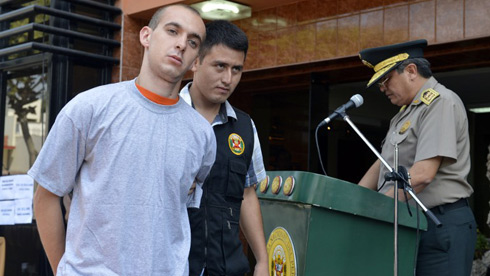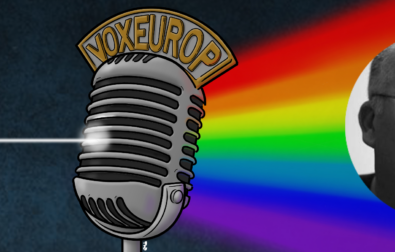Lima Airport, 7pm In the departure hall, the night flights leaving for Europe have been announced. Leaning on a footbridge overlooking the baggage check-in area, an officer of DIRANDRO (Anti-Drug Directorate of Peru’s National Police) observes the steady stream of passengers, picking out those who look nervous or who are conspicuously avoiding the dogs and the police in uniform.
Lower down, other agents are scanning the faces: red and sunken eyes, a white tongue and breath smelling of latex inevitably trip up the “mules” who have swallowed cocaine.
Suddenly, in an imperceptible move, a man and his suitcase are plucked from the crowd. The suspect is led to the DIRANDO office, where he is handcuffed at the ankles and wrists. His suitcase is flipped open, and the officers pull out a child’s rug. It doesn’t take more than 10 minutes for the investigators to uncover about 3kg of pure cocaine, carefully packed in black plastic bags and hidden under a fleece lining. “It’s a Romanian this time,” says the unit commander, Anderson Reyes, head of the anti-drug department at the airport.
‘The crisis made me do it’
About 8kg of cocaine are seized there every day. “We also have Greeks, Bulgarians, French, and of course the Spanish, who come in the biggest numbers. This year they’ve outnumbered the Peruvian smugglers. They all tell us the same story: the economic crisis made them do it.”
It’s a massive phenomenon: 695 Europeans are in prison in Peru, 90 per cent for smuggling drugs. In 2011, this country became the biggest exporter of cocaine to Europe. The mules who slip out between the cracks can earn up to €10,000. For others, the journey often ends at Callao prison, near the airport. The prison has a terrible reputation, like the neighbourhood around it.
A group of French and Spanish people leave the wing reserved for foreigners, and enter a walkway, where chairs have been set up. Very quickly, some of the professional traffickers slip away, but the others stay behind to tell the unbelievable story of what their life has become.
One is Timoteo, a former nightclub doorman in Barcelona: “I was only working weekends. My wife was pregnant, and we were two months behind with the rent. That was when I met a guy called David. He said I could make a lot of money by doing this trip to Peru. All expenses paid, no risks, he said. I hesitated, but he kept pressing me. There are professionals in Spain whose job is to recruit people in critical situations, like me. They come looking for you. They want you.”
European look
Jeremy tells what happened next. A young Parisian, from a religious Jewish family, a baker in Brussels, was recruited by one of his clients: “He booked a room for me in Miraflores, the beautiful district of Lima. He asked me to play the tourist, that's all. I was given a mobile phone number for the local contacts, and on the last day an Italian asked me to smash the chip in the phone and come to a hotel to meet him.
“There I was given the suitcase. On “check-in” day, I was asked to step behind the counter. A policeman stuck a knife into my suitcase and inserted a cotton swab into the hole. ‘If it comes out blue,’ he told me, ‘it means your bag has cocaine in it.’ It came out all blue, of course.” Jeremy knows why he was recruited. “I have no criminal record, I don’t do drugs, I have a good European look that passes through border checks well. And I needed money.”
It’s the same story for Jean-Christian, another of the 15 French citizens imprisoned in Peru, who survives by selling massages to his fellow prisoners. And for Ivan, a municipal employee from Madrid, and Gustavo, who is unemployed, who holds the record in the group for having transported 10kg of cocaine in a single trip. All got the same sentence: six years and eight months.
After two-and-a-half years, Europeans get a conditional parole and can usually get out of jail, but are not allowed to fly back to their home country. That’s the start of another bad dream. “These people, who are not professional traffickers, are forced to try to leave Peru illegally, with all the risks that entails,” complains Castillo Torres, from the Office of the Defence of the People. “For those who can’t do it, there’s the street, or some religious houses that will take them in.”
‘Granny narcos’
The Casa Acogida, in Callao, is one of these institutions. There is no sign on its wall. The doorbell, which is behind a grating, has no name next to it. “In a neighbourhood like this, it’s better to be low-key,” explains Julia, opening the door. At 58, this grandmother from Barcelona, who ought to be busy spoiling her grandchildren, was arrested at the airport in Lima with a suitcase “crammed” with cocaine.
We pass an altar dedicated to the Virgin Mary, decorated with some flowers, before climbing to the upper floor, where there is a small lounge. Roberta is already sitting there. The old shopkeeper speaks bluntly: “I’m 62 years old and I couldn’t get by on my single pension. I had 4kg of the stuff, taped all around my body.”
The story of these “granny narcos” is so bewildering that they feel the need to flip through the stack of photocopies that detail their conviction and sentencing. “I worked for 35 years in geriatric care,” Julia says.
“When the housing bubble burst in Spain, my son, whom I lived with, lost his job at a building site. He has four children, and he could no longer pay the bills. Then a friend told me that he had already travelled to Peru twice, and hadn’t had any problem. They dangle money in front of your nose, this money you’re really missing, and you run after it like a jackass!”
Was this article useful? If so we are delighted!
It is freely available because we believe that the right to free and independent information is essential for democracy. But this right is not guaranteed forever, and independence comes at a cost. We need your support in order to continue publishing independent, multilingual news for all Europeans.
Discover our subscription offers and their exclusive benefits and become a member of our community now!












